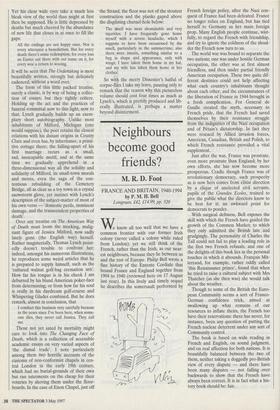Neighbours become good friends?
M. R. D. Foot
FRANCE AND BRITAIN, 1940-1994 by P. M. H. Bell Longman, £42, £14.99, pp. 320 We know all too well that we have a common frontier with our former Irish colony (never called a colony while ruled from London); yet we still think of the French, rather than the Irish, as our near- est neighbours, because they lie between us and the rest of Europe. Philip Bell wrote a fine history of the Entente Cordiale that bound France and England together from 1904 to 1940 (reviewed here on 17 August last year). In this lively and timely sequel he describes the somersault performed by French foreign policy, after the Nazi con- quest of France had been defeated. France no longer relies on England, but has tied herself` to Germany as her main foreign prop. Many English people continue, wist- fully, to regard the French with friendship, and try to ignore the coldness of the shoul- der the French now turn to us.
The world war was bound to separate the two nations; one was under hostile German occupation, the other was at first almost friendless, and then under partial friendly American occupation. These two quite dif- ferent destinies could not help affecting what each country's inhabitants thought about each other; and the circumstances of the liberation of France in 1944 brought in a fresh complication. For General de Gaulle created the myth, necessary to French pride, that the French had saved themselves by their resistance struggle from the indignities of the Nazi occupation and of Petain's dictatorship. In fact they were rescued by Allied invasion forces, American, Canadian, British and Polish, to which French resistance provided a vital supplement.
Just after the war, France was prostrate, even more prostrate than England; by her own efforts, she has now become more prosperous. Cradle though France was of revolutionary democracy, such prosperity as is now hers comes from elitist direction by a clique of unelected civil servants, pupils of the Grandes Ecoles, trained to give the public what the directors know to be best for it; an awkward point for democrats to ponder.
With surgical deftness, Bell exposes the skill with which the French have guided the growth of the Common Market; to which they only admitted the British late and grudgingly. The personality of Charles the Tall could not fail to play a leading role in the first two French refusals; and one of the delights of this book lies in the personal touches in which it abounds. Francois Mit- terrand, for example, rather oddly called `this Renaissance prince', found that when he tried to raise a cultural subject with Mrs Thatcher (as she then was) she would talk about the weather.
Though to some of the British the Euro- pean Community seems a sort of Franco- German confidence trick, aimed at swallowing up what remains of our resources to inflate theirs, the French too have their reservations: there has never, for instance, been any question of putting the French nuclear deterrent under any sort of Community control.
The book is based on wide reading in French and English, on sound judgment, and on real affection for both nations. It is beautifully balanced between the two of them, neither taking a doggedly pro-British view of every dispute — and there have been many disputes — nor falling over backwards to show that the French have always been correct. It is in fact what a his- tory book should be: fair.


































































 Previous page
Previous page